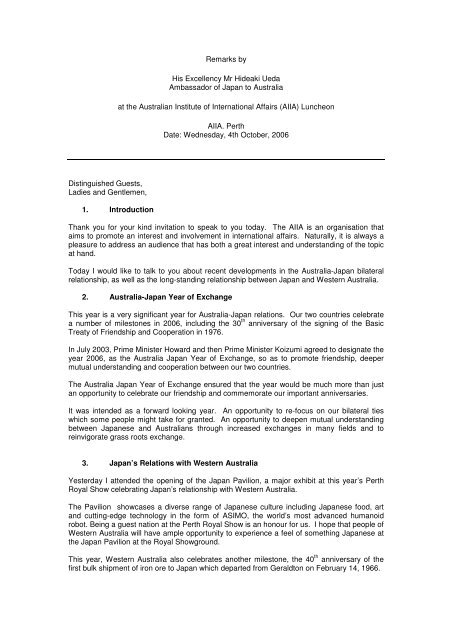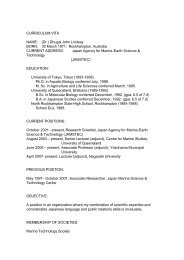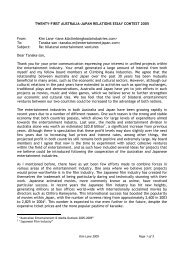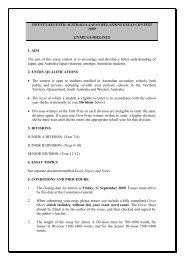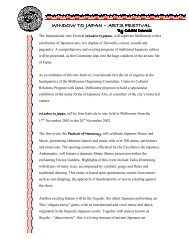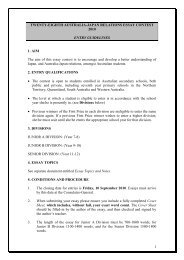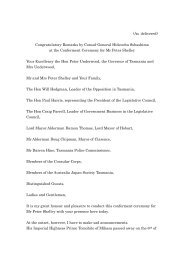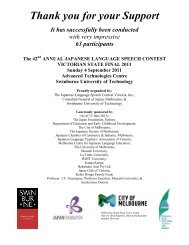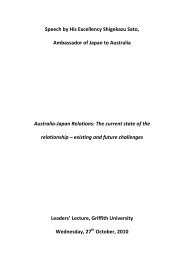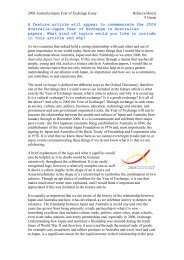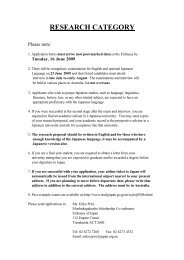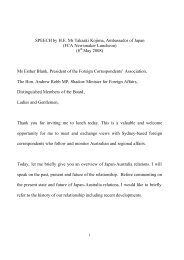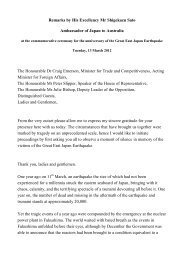Remarks by His Excellency Mr Hideaki Ueda Ambassador of Japan ...
Remarks by His Excellency Mr Hideaki Ueda Ambassador of Japan ...
Remarks by His Excellency Mr Hideaki Ueda Ambassador of Japan ...
Create successful ePaper yourself
Turn your PDF publications into a flip-book with our unique Google optimized e-Paper software.
<strong>Remarks</strong> <strong>by</strong><br />
<strong>His</strong> <strong>Excellency</strong> <strong>Mr</strong> <strong>Hideaki</strong> <strong>Ueda</strong><br />
<strong>Ambassador</strong> <strong>of</strong> <strong>Japan</strong> to Australia<br />
at the Australian Institute <strong>of</strong> International Affairs (AIIA) Luncheon<br />
AIIA. Perth<br />
Date: Wednesday, 4th October, 2006<br />
Distinguished Guests,<br />
Ladies and Gentlemen,<br />
1. Introduction<br />
Thank you for your kind invitation to speak to you today. The AIIA is an organisation that<br />
aims to promote an interest and involvement in international affairs. Naturally, it is always a<br />
pleasure to address an audience that has both a great interest and understanding <strong>of</strong> the topic<br />
at hand.<br />
Today I would like to talk to you about recent developments in the Australia-<strong>Japan</strong> bilateral<br />
relationship, as well as the long-standing relationship between <strong>Japan</strong> and Western Australia.<br />
2. Australia-<strong>Japan</strong> Year <strong>of</strong> Exchange<br />
This year is a very significant year for Australia-<strong>Japan</strong> relations. Our two countries celebrate<br />
a number <strong>of</strong> milestones in 2006, including the 30 th anniversary <strong>of</strong> the signing <strong>of</strong> the Basic<br />
Treaty <strong>of</strong> Friendship and Cooperation in 1976.<br />
In July 2003, Prime Minister Howard and then Prime Minister Koizumi agreed to designate the<br />
year 2006, as the Australia <strong>Japan</strong> Year <strong>of</strong> Exchange, so as to promote friendship, deeper<br />
mutual understanding and cooperation between our two countries.<br />
The Australia <strong>Japan</strong> Year <strong>of</strong> Exchange ensured that the year would be much more than just<br />
an opportunity to celebrate our friendship and commemorate our important anniversaries.<br />
It was intended as a forward looking year. An opportunity to re-focus on our bilateral ties<br />
which some people might take for granted. An opportunity to deepen mutual understanding<br />
between <strong>Japan</strong>ese and Australians through increased exchanges in many fields and to<br />
reinvigorate grass roots exchange.<br />
3. <strong>Japan</strong>’s Relations with Western Australia<br />
Yesterday I attended the opening <strong>of</strong> the <strong>Japan</strong> Pavilion, a major exhibit at this year’s Perth<br />
Royal Show celebrating <strong>Japan</strong>’s relationship with Western Australia.<br />
The Pavilion showcases a diverse range <strong>of</strong> <strong>Japan</strong>ese culture including <strong>Japan</strong>ese food, art<br />
and cutting-edge technology in the form <strong>of</strong> ASIMO, the world’s most advanced humanoid<br />
robot. Being a guest nation at the Perth Royal Show is an honour for us. I hope that people <strong>of</strong><br />
Western Australia will have ample opportunity to experience a feel <strong>of</strong> something <strong>Japan</strong>ese at<br />
the <strong>Japan</strong> Pavilion at the Royal Showground.<br />
This year, Western Australia also celebrates another milestone, the 40 th anniversary <strong>of</strong> the<br />
first bulk shipment <strong>of</strong> iron ore to <strong>Japan</strong> which departed from Geraldton on February 14, 1966.
• WA Pearling <strong>His</strong>tory<br />
Of course, the history <strong>of</strong> <strong>Japan</strong>-Western Australian relations goes back even further. At the<br />
beginning <strong>of</strong> the 20th Century, almost 4000 <strong>Japan</strong>ese were involved in the pearling industry,<br />
many <strong>of</strong> those at Broome, which at the time was the largest pearling centre in the world.<br />
In the early 1900’s, <strong>Japan</strong>ese divers, making up to fifty dives per day, risked shark attacks,<br />
lung infections and the bends, as they carried out their dangerous and <strong>of</strong>ten lethal work.<br />
<strong>Japan</strong>ese divers could remain submerged at 50 to 130 feet for extended periods <strong>of</strong> time.<br />
If the divers ascended too rapidly they could die. <strong>His</strong>tory tells us that scores <strong>of</strong> <strong>Japan</strong>ese<br />
divers were killed or crippled <strong>by</strong> the bends. The historic <strong>Japan</strong>ese cemetery at Broome<br />
stands as a testament to the lives lost and the sacrifice made <strong>by</strong> the many <strong>Japan</strong>ese divers.<br />
Looking back today, Broome’s pearling industry and resulting long-held historic ties to <strong>Japan</strong>,<br />
can now be seen as the beginning <strong>of</strong> a relationship between <strong>Japan</strong> and Western Australia<br />
that would grow on expanded trade.<br />
• Trade Relations<br />
Today our bilateral ties are wide ranging and indeed, I will speak later on the increased<br />
political and security cooperation between our two nations. But trade still remains a vitally<br />
important pillar <strong>of</strong> our partnership.<br />
How important<br />
<strong>Japan</strong> is still Australia’s largest trade partner. One fifth <strong>of</strong> all Australian exports go to <strong>Japan</strong>.<br />
<strong>Japan</strong> remains the number one market for a wide range <strong>of</strong> Australian goods including coal,<br />
liquefied natural gas (LNG), and agricultural products.<br />
The story is no different in Western Australia. As we all know, Western Australia is the<br />
nation's No.1 export State, accounting for 32.6 per cent <strong>of</strong> Australia's total merchandise<br />
exports. And once again, <strong>Japan</strong> is Western Australia’s largest export market. In 2005-06<br />
Western Australia exports to <strong>Japan</strong> totalled over $A10.8 billion, which accounted for 39 per<br />
cent <strong>of</strong> the state’s total exports.<br />
The statistics are just as impressive from <strong>Japan</strong>’s viewpoint. Australia is the largest supplier<br />
<strong>of</strong> strategically important goods such as coal and iron ore whose shares <strong>of</strong> <strong>Japan</strong>’s imports<br />
are 65 and 55 per cent respectively.<br />
Australia supplies <strong>Japan</strong> with 33 per cent <strong>of</strong> its uranium imports and 16 per cent <strong>of</strong> its LNG<br />
imports. Australia is also the second largest supplier <strong>of</strong> cotton and the third largest supplier <strong>of</strong><br />
wheat to <strong>Japan</strong>.<br />
Currently 90 per cent <strong>of</strong> <strong>Japan</strong>’s beef imports come from Australia. That is a result, not just <strong>of</strong><br />
the ban on US beef imports which has recently been lifted, but also a reflection <strong>of</strong> how trusted<br />
and popular Australian beef is in <strong>Japan</strong>.<br />
It should be acknowledged that <strong>Japan</strong>ese know-how helped the Australian beef industry<br />
develop product that was more suited to the <strong>Japan</strong>ese market.<br />
The impact <strong>of</strong> the <strong>Japan</strong>ese market on the Australian resources industry, in the 40 years<br />
since that first bulk shipment <strong>of</strong> iron, should not be underestimated or forgotten. The current<br />
close relationship we share is the result <strong>of</strong> the wisdom and efforts <strong>of</strong> our predecessors.<br />
Next year, Australia and <strong>Japan</strong> will celebrate the 50 th Anniversary <strong>of</strong> the signing <strong>of</strong> Agreement<br />
on Commerce between Australia and <strong>Japan</strong>, which has provided a legal framework to support<br />
the stable bilateral economic relations.<br />
This is a perfect opportunity for us not only to reflect on our paths in the past but to look<br />
ahead and consider the future direction for us to take.<br />
1
• Resources and Energy<br />
Today, we have seen tremendous oil price hikes. Also, two emerging economies, China and<br />
India, are responsible for driving demand for resources upward.<br />
The rapidly increasing international demand for resources means that the question <strong>of</strong> energy<br />
and food security has become an issue <strong>of</strong> great importance to all nations. I note with interest,<br />
that the AIIA will hold a symposium on this very topic next week in Canberra, examining the<br />
impact <strong>of</strong> energy security on Australia’s international relations.<br />
Let’s look at the current and future Australia-<strong>Japan</strong> trade ties from such a perspective.<br />
Firstly, <strong>Japan</strong>ese investment in the resource sector continues to be significant, including<br />
involvement in major projects such as the North West Shelf and the Bayu-Undan Field LNG<br />
project.<br />
Existing investments include coal, iron-ore, aluminium, timber and mineral sands. Many<br />
Western Australian iron ore projects involve <strong>Japan</strong>ese investment, including the Robe River<br />
joint venture which exports 40 million tonnes <strong>of</strong> iron ore a year and employs 950 people.<br />
• Environment Issues<br />
Just as important are the environmental issues. Both nations have invested in clean energy<br />
technologies and emission management. It is worth noting that in terms <strong>of</strong> total energy<br />
consumption, <strong>Japan</strong> ranks fourth but on a per capita basis its consumption is half that <strong>of</strong> the<br />
United States.<br />
Australia and <strong>Japan</strong> are working together on ultra-clean coal technologies. The CSIRO<br />
together with UCC energy and Mitsubishi Heavy Industries have been developing a product<br />
which could reduce greenhouse gas emissions <strong>by</strong> 20 per cent.<br />
Academics at the University <strong>of</strong> Melbourne and Meiji University are carrying out work on CO2<br />
emissions geo-sequestration research, while in 2004, eleven major Australian and <strong>Japan</strong>ese<br />
coal industry partners committed themselves to a study <strong>of</strong> the potential application <strong>of</strong> clean<br />
coal technology to electricity generation.<br />
<strong>Japan</strong> has long made it a priority to tackle the issue <strong>of</strong> climate change. With the entering into<br />
effect <strong>of</strong> the Kyoto Protocol on February 16, 2005, the international community took its first<br />
step toward enhancing efforts for the prevention <strong>of</strong> global warming.<br />
Australia initiated the Asia-Pacific Partnership for Clean Development and Climate in July last<br />
year with the participation <strong>of</strong> six countries, Australia, <strong>Japan</strong>, together with the US, China, India,<br />
and the Republic <strong>of</strong> Korea.<br />
And the first ministerial meeting was chaired <strong>by</strong> Foreign Minister Downer in Sydney. This<br />
partnership complements the Kyoto Protocol and aims to respond to environmental<br />
challenges such as pollution, energy security, and climate change issues through the<br />
development <strong>of</strong> and diffusion <strong>of</strong> clean, efficient technology.<br />
<strong>Japan</strong> is more than simply a good customer. It remains a trusted and reliable partner. It’s<br />
existing and future projects, investments and joint ventures, and accompanying technology<br />
and environmental record together with Australia’s record as a reliable supplier should ensure<br />
that resources trade between <strong>Japan</strong> and Australia continues to be both as complementary<br />
and as vital to both countries in the future, as it was throughout the last five decades.<br />
4. Bilateral Relations<br />
I would now like to examine our bilateral relations more broadly. In recent years, political and<br />
security issues have come to the forefront and here too, Australia and <strong>Japan</strong> have<br />
2
successfully worked together to promote peace, stability and economic prosperity in the<br />
Pacific region and throughout the world.<br />
In an acknowledgment <strong>of</strong> these growing ties, Prime Minister Howard, on a number <strong>of</strong><br />
occasions has stated that “Australia has no greater friend in Asia than <strong>Japan</strong>.”<br />
In March this year, at the Foreign Ministerial talks, Foreign Minister Downer and Foreign<br />
Minister Aso, jointly declared that “Australia and <strong>Japan</strong> had developed a comprehensive<br />
strategic relationship <strong>of</strong> great significance for both countries.’<br />
• Iraq<br />
Cooperation in Iraq between <strong>Japan</strong> and Australia was a ‘complete success’. The Australian<br />
Government dispatched 450 troops to Al Muthanna province in Iraq to provide security for the<br />
<strong>Japan</strong>ese Self Defence Force engineers who were providing humanitarian and reconstruction<br />
assistance in the province. <strong>Japan</strong> highly appreciated the Australian deployment.<br />
• North Korea<br />
Recently, our two countries cooperated effectively on measures in response to North Korean<br />
issues. The Government <strong>of</strong> <strong>Japan</strong> highly values and appreciates that the Australian<br />
government announced financial measures to restrict financial transaction related to North<br />
Korean weapons <strong>of</strong> mass destruction in accordance with UNSC1695 on the same day as<br />
<strong>Japan</strong> announced such measures.<br />
Such concerted actions <strong>by</strong> Australia, <strong>Japan</strong> and the US, which had already taken similar<br />
measures, demonstrated our strong determination to North Korea.<br />
• Upgrading <strong>of</strong> tri-lateral security dialogue<br />
We have witnessed significant progress in a trilateral cooperation among Australia, <strong>Japan</strong> and<br />
the United States. In March in Sydney, U.S. Secretary <strong>of</strong> State Rice joined Foreign Minister<br />
Downer and Foreign Minister Aso for the inaugural Ministerial meeting <strong>of</strong> the Trilateral<br />
Strategic Dialogue. This meeting added a new dimension to the <strong>Japan</strong>-Australia bilateral<br />
relationship.<br />
• New Administration – committed to advancing relations further<br />
Just over a week ago, <strong>Mr</strong> Shinzo Abe, former Chief Cabinet Secretary, became <strong>Japan</strong>’s new<br />
Prime Minister. <strong>Mr</strong> Shinzo Abe attaches great importance to Australia-<strong>Japan</strong> bilateral<br />
relations. <strong>His</strong> grandfather, Nobusuke Kishi, former Prime Minister from 1957 to 1960, signed<br />
the 1957 Agreement on Commerce between Australia and <strong>Japan</strong>.<br />
Speaking at his very first general-policy speech delivered at the opening <strong>of</strong> a Diet session on<br />
29 th September, <strong>Mr</strong> Abe emphasized building stronger ties with Australia, along with India and<br />
the United States, which all share important values in this region. I strongly believe that under<br />
his leadership, the Australia-<strong>Japan</strong> comprehensive strategic partnership will be further<br />
materialised in a wide range <strong>of</strong> areas.<br />
• Strengthening Defence Cooperation<br />
One <strong>of</strong> those areas could be the security front. When <strong>Mr</strong> Downer visited <strong>Japan</strong> in August,<br />
some sort <strong>of</strong> agreement for defence cooperation between Australia and <strong>Japan</strong> was proposed.<br />
We are more than happy to explore the possibility <strong>of</strong> the framework to further strengthen<br />
defence cooperation in due course.<br />
3
• Acceleration <strong>of</strong> FTA Joint Study<br />
When Prime Minister Howard and the then Prime Minister Koizumi met last year in Tokyo,<br />
both Prime Ministers agreed that Australia and <strong>Japan</strong> would undertake a FTA Joint Study<br />
which would examine the pros and cons <strong>of</strong> a Free Trade Agreement. The decision is a<br />
reflection <strong>of</strong> the importance <strong>of</strong> deepening the bilateral economic partnership as part <strong>of</strong> the<br />
strategic relationship.<br />
The feasibility study was originally projected to last for two years but the process could be<br />
accelerated. At that point both governments can then make a decision to proceed to the next<br />
step. I truly hope that we will find a realistic solution which is beneficial for both <strong>of</strong> us.<br />
I am also confident that such a solution will provide greater opportunity to extend and<br />
strengthen bilateral economic and social relations between <strong>Japan</strong> and Australia, and<br />
especially between <strong>Japan</strong> and Western Australia<br />
• APEC Meeting in Australia in 2007<br />
Australia will host next year’s APEC meeting. This provides another valuable opportunity for<br />
<strong>Japan</strong> and Australia to work together to produce concrete outcomes in an important regional<br />
forum.<br />
I would like to conclude my speech <strong>by</strong> saying that it is my hope that the renewed interest and<br />
focus on Australia-<strong>Japan</strong> bilateral relations will be sustained in the following 12 months and<br />
beyond, and that our highly successful partnership and friendship will continue to flourish and<br />
expand in the years ahead.<br />
Thank you.<br />
[END]<br />
4


